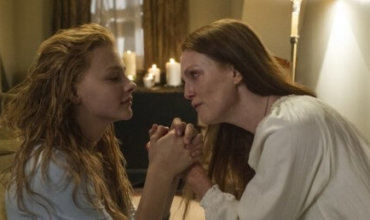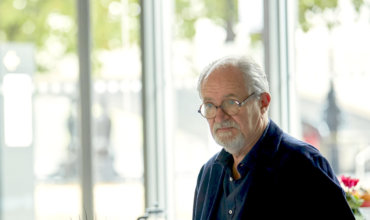Gloria Grahame was a Hollywood film star in the 1940s and 1950s. Her fame has not endured with the general public. Modern audiences tend to know her for one thing only, Violet Bick, the “It Girl” of Bedford Falls in Frank Capra’s IT’S A WONDERFUL LIFE (1946). Grahame’s career was tumultuous and she frequently had trouble on film sets attempting to deal with her insecurities about acting. This happened even after she won a Best Supporting Actress Oscar in Vincente Minnelli’s THE BAD AND THE BEAUTIFUL (1952). Her private life was also a frequent source of trouble and would often feature in the gossip magazines. She was married four times and had four children.
By the late 1970s, her star had waned considerably and she was taking small supporting roles in movies and on television. In 1978, while doing a play in England, she met a young amateur actor from Liverpool called Peter Turner. They were living in the same boarding house. Within a relatively short period, they were in a relationship. Although Turner knew slightly about Grahame and her career through the fandom of his parents, he was attracted to the sheer “otherness” of the older, sophisticated, flirtatious former film star. She was 54 and he was 26.
As the film shows us with great detail and nuance, Turner eventually discovers Grahame’s life is absolutely bounded by her fears and her avoidance of conflict. If she doesn’t like the sound of a course of action, she resolutely refuses to acknowledge there is a problem. Her trip to England puts her difficulties with her mother, sister, ex-husbands and grown-up children safely back in the United States and for a time, her relationship with Peter is utterly idyllic.
The full arc of their tale is not long nor complicated and director Paul McGuigan works through the details of the story with real verve. Although much of the American part of this low budget movie appears to be green-screened (New York and Hollywood exteriors in particular) this contributes to a dream-like aesthetic. The real streets of Turner’s non-glamorous working-class home are contrasted with the bright, shining glamour of Grahame’s. At one point they spend some time in California, in a beach side trailer home that she lives in. Despite this being exactly where one would not expect a film star, Turner finds it lovely. He is far from his own home, enjoying the sun on the doorstep of the Dream Factory with a woman that he loves. McGuigan and screenwriter Matt Greenhalgh even present us with the lovers’ alternative viewpoints at a crucial point in the narrative and this beautifully adds depth to the characterisation and story.
Jamie Bell’s performance of Turner is excellent and touching. He shows us the man’s youth, inexperience and a certain level of wariness. Annette Bening’s Gloria Grahame is a winning portrayal at many levels; we see how she is damaged, funny, tough, self-centered, a trial to get close to and yet defined utterly by how she wants to love. The film works as a love story because Bening and Bell’s chemistry draws us in. Grahame and Turner have discovered themselves in an unexpected place. Each is delighted to have found the other. Both are surprised how much they connect to such an unlikely lover. Julie Walters plays Bella who is Peter Turner’s mother and hers is the other treasurable performance in what is, for the most part, a two-hander.
FILMSTARS DON’T DIE IN LIVERPOOL is a tender and unlikely romance with first rate acting from the leads. 105 minutes. (8/10)


